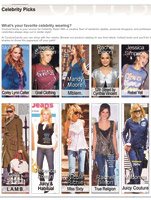EBay Being Sued by Tiffany
EBay Inc. might have to change its way of doing business if it loses a precedent-setting lawsuit by Tiffany & Co., which charges that the online marketplace is not taking adequate steps to prevent or remove counterfeit product from getting on the popular auction Web site. The outcome of the lawsuit would then apply to many branded items, including apparel and textiles, which already experience a high volume of counterfeit abuse.
The case is at the discovery stage, but legal experts say it should go to court by year’s end. “If Tiffany wins, this is a groundbreaking case,” intellectual property attorney Joseph Berghammer of Chicago-based Banner & Witcoff Ltd. said. “It changes the electronic marketplace. EBay would no longer just provide a tent, it would also have to provide police.”
New York–based Tiffany contends that San Jose–based eBay is obliged to take responsibility for authenticating items offered by sellers. Tiffany acknowledges that in 2003 and 2004 it got eBay to remove more than 19,000 auctions selling counterfeit Tiffany goods. But eBay claims it is only a marketplace that brings buyers and sellers together and cannot be responsible for the authenticity of the 78 million items for sale on its site.
“In the early days, courts were lenient as the [business] model worked itself out,” said Ina Steiner, publisher of AuctionBytes.com, an online newsletter. “But eBay has become such a market force, and so many consumers make purchases on eBay, that the courts may view it differently as time goes on.”
Lose/lose proposition?
Even if the court does not take Tiffany’s side, the popular perception that eBay is not providing enough consumer protection could spark action by lawmakers that might inflate the cost of doing e-commerce and compromise the otherwise improving image of shopping online, analysts say.
EBay spokesman Hani Durzy said the company was “disappointed” that Tiffany filed the suit, given that both companies have collaborated in the past in removing auctions of fake Tiffany products. “While we will continue to cooperate with Tiffany in these efforts, we will fight the legal action, because its claims are without merit,” Durzy said.
As a marketplace, eBay provides only the online real estate for goods to be sold and never sees or actually touches the items, Durzy said. Therefore, the responsibility lies with the trademark owners to watch for counterfeits. When an item is found to be fake, eBay immediately removes it from the site. “[The brand/trademark] owners are the only ones who can truly understand who owns the rights and what is fake and what is real,” Durzy added.
Tiffany, however, is arguing that eBay is more than a neutral vendor offering an online mall. The company has advertised Tiffany product among its merchandise, said James Swire, lead attorney for Tiffany and a partner in the Washington, D.C.–based law firm Arnold & Porter LLP. In addition, eBay has placed sponsored links on Google and Yahoo! advertising the availability of Tiffany goods. “Unfortunately, most of the advertised items were fake,” Swire said. “Those are indicative of the kinds of things they [eBay principals] are doing that show they are not just a renter of space,” Swire said.
Tiffany alleges that as many as three out of four Tiffany items sold on eBay are counterfeit and that eBay is aware of the problem but negligent in attempting to stop it.
Site Review: Eye Candy
CoutureCandy.com started simply in 2004 as an online fashion information portal for young, cutting-edge designer lines, celebrity product placements and their e-fashionista fans. The only complaint the site received was that it didn’t sell anything.
So, last July, CoutureCandy added an e-commerce element, empowering designers and retailers to manage and sell their inventory through the site. Vendors ship their goods to the company, where CoutureCandy digitally photographs the merchandise and then uploads the product images to the site.
Perhaps the niftiest and most popular shopping feature is what the “hippest” celebrities are wearing. Go to the “Celebrity Picks” page and up pop images of 28 hot stars wearing many California designer lines for sale. For example, there’s Nicole Richie in Miss Sixty, Angelina Jolie in Oliver Peoples, Ashlee Simpson in BCBG and so on. Click on an image and you’re into the online store’s additional offerings of that line.
The frequently updated “Latest Addictions” page shows off the newest online shop additions plus trends; “CoutureTalk” allows viewers to comment and respond in a user-friendly format; and “Personal Stylist” offers gift ideas. If that weren’t enough, there’s even a live online-chat feature.
Vendor participation is free, and only when an item sells does CoutureCandy take a [negotiable] share in the profits. Sales of merchandise now top $150,000 per month.























